 Petzlover
Petzlover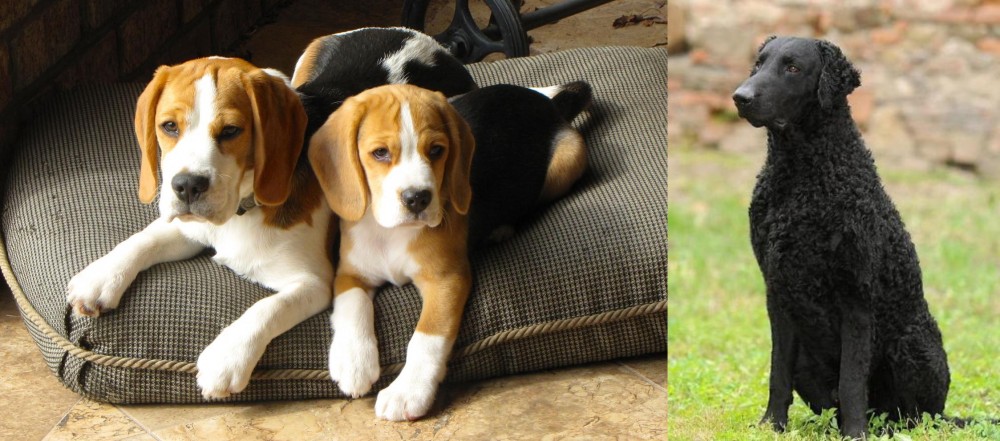 Both Beagle and Curly Coated Retriever are originated from United Kingdom. Beagle may grow 28 cm / 11 inches shorter than Curly Coated Retriever. Beagle may weigh 29 kg / 63 pounds lesser than Curly Coated Retriever. Both Beagle and Curly Coated Retriever has almost same life span. Both Beagle and Curly Coated Retriever has almost same litter size. Both Beagle and Curly Coated Retriever requires Low Maintenance.
Both Beagle and Curly Coated Retriever are originated from United Kingdom. Beagle may grow 28 cm / 11 inches shorter than Curly Coated Retriever. Beagle may weigh 29 kg / 63 pounds lesser than Curly Coated Retriever. Both Beagle and Curly Coated Retriever has almost same life span. Both Beagle and Curly Coated Retriever has almost same litter size. Both Beagle and Curly Coated Retriever requires Low Maintenance.
 There are some accounts of similar size dogs used for hunting in Greece in 5th century BCE. During 8th century the Talbot Hound breed was created. In 11th century Talbot Hound was brought to England by William the Conqueror. While using in hunting they are found to be a slow runner. To overcome the situation and increase their running speed the hunting people bred Talbot Hound with Grey hounds. The beagles described earlier were very small in size and are said as pocket beagles.
There are some accounts of similar size dogs used for hunting in Greece in 5th century BCE. During 8th century the Talbot Hound breed was created. In 11th century Talbot Hound was brought to England by William the Conqueror. While using in hunting they are found to be a slow runner. To overcome the situation and increase their running speed the hunting people bred Talbot Hound with Grey hounds. The beagles described earlier were very small in size and are said as pocket beagles.
 There isn’t much on the origin of the Curly-Coated Retriever and his history hasn’t been well documented.
There isn’t much on the origin of the Curly-Coated Retriever and his history hasn’t been well documented.
The dog originated some time ago in the early 19th century, with some believing that the dog was in England during the late 1700s already.
It is thought that this dog, which is identical to the Labrador but with a tight, curly coat, descended from the Old English Water Dog, the Irish Water Spaniel and the smaller Newfoundland. This mix was later crossed with the Poodle and this is where the curls come into the picture.
The Curly-Coated Retriever gained substantial recognition in England during the mid-1800s and exported to the United States in 1907. The dog was also later exported to Australia and New Zealand and has been recognized by the American Kennel Club in 1924.
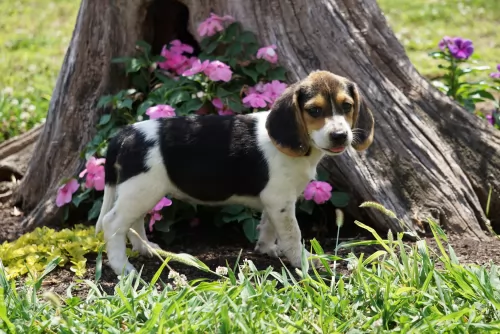 They are small and compact breed, and always happy and fun loving. They should be trained by patient and creative training techniques. Beagles are very much interested in using their nose in finding interesting scents and are food focussed. They always wake their neighbours at 6 am by their half howling. They think everyone is their best friend and love to have friendship with other animals and humans. They have about 220 million scent receptors and are said as "a nose with feet" by humorist Dave Barry.
They are small and compact breed, and always happy and fun loving. They should be trained by patient and creative training techniques. Beagles are very much interested in using their nose in finding interesting scents and are food focussed. They always wake their neighbours at 6 am by their half howling. They think everyone is their best friend and love to have friendship with other animals and humans. They have about 220 million scent receptors and are said as "a nose with feet" by humorist Dave Barry.
We can see beagles at many airports in their duty. They can easily trace out the illegal things being smuggled. Since they are small in size they are suitable for apartment living. But they like to walk around several times. They should be exercised for plenty of time. Obedience training should be given to them by giving food reward. Beagles are wanderers of nature and so if possible they will try to escape. So it is necessary to make them microchipped or to wear a collar, to find them easily.
 The Curly Coated Retriever is a medium sized dog standing at about 58–69cm and weighing anything between 25 – 40kg. The dog, mainly black or chocolate brown, is active and muscled and was used for hunting and retrieving waterfowl.
The Curly Coated Retriever is a medium sized dog standing at about 58–69cm and weighing anything between 25 – 40kg. The dog, mainly black or chocolate brown, is active and muscled and was used for hunting and retrieving waterfowl.
The coat has small, tight curls over the body except for the face and the legs. He has floppy ears and they eyes of the black dog are brown while in the liver-colored dogs, the eyes are amber or gold.
The tail is long. He has a wedge shaped head, and its the fact that the face is more long than wide which makes him easily distinguishable from other retriever breeds. Of course, it is the curly coat which is the dog’s most distinguishing feature.
The Curly Coated Retriever has been used as a gun dog, and today, like most retrievers, they make superb pets and are a lively, social and fun-loving breed. He becomes loyal and devoted to his human family members, making a splendid pet, but then he must be exercised.
Have him trained and socialized and he becomes an obedient, relaxed dog, eager to please. He is intelligent and self-confident and gets on well with children in the home as well as with other pets.
He fits in easily to city and country life, but if he could have large grounds to run, play and swim, which he loves, he would be at his happiest.
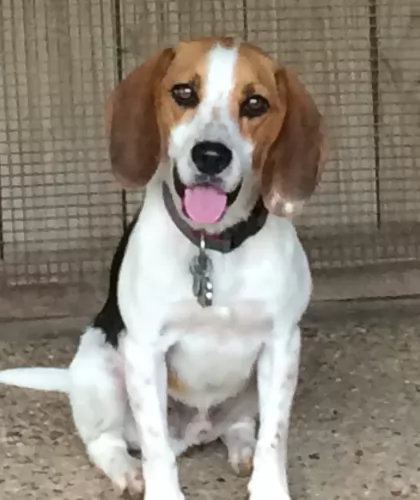 They are very good companion for children. They love to play and spend time with children.
They are very good companion for children. They love to play and spend time with children.
They have millions of scent receptors and so they can be seen in Airports and many important places in duty. Also they are interested in hunting small rodents.
They adapt well for apartment living but they don't like being alone for a long time. If kept alone for a long time in back yard they will begin to bark and dig pit or try to escape. Beagle likes hot weather more than cold weather.
Beagles are difficult to train up. Many people say it will take about one year to house train beagles. They have an attitude of "what's in it for me". But it depends on the personality and temperament of the individual.
 Curly Coated Retrievers are such fun dogs, full of personality, robust and active. He makes such a wonderful pet and is loving, loyal and protective. He is brave, courageous, independent and confident as well. He gets on well with children and loves to be part of all their games. He is capable of getting on well with other animals in the home.
Curly Coated Retrievers are such fun dogs, full of personality, robust and active. He makes such a wonderful pet and is loving, loyal and protective. He is brave, courageous, independent and confident as well. He gets on well with children and loves to be part of all their games. He is capable of getting on well with other animals in the home.
He is an active dog and won’t fit in well with those who like to sit around all day. He wants to be active, and then loves to settle down with his human family at night. He is an excellent all-rounder and makes a loving, loyal pet.
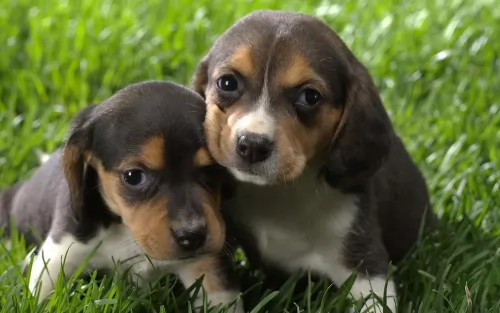 Beagle's ears should be checked occasionally for any sign of infections like discoloured wax, dirt or foul odour. Also their nails should be trimmed regularly. They should be exercised regularly in order to maintain a proper weight. The most common health problems in beagles are obesity, epilepsy and allergies.
Beagle's ears should be checked occasionally for any sign of infections like discoloured wax, dirt or foul odour. Also their nails should be trimmed regularly. They should be exercised regularly in order to maintain a proper weight. The most common health problems in beagles are obesity, epilepsy and allergies.
They are average shedders and having short hair thus it is easy to groom. They should be made to bath with a mild and non irritant shampoo.
 With good care, the average life expectancy of the Curly-Coated Retriever can reach between 10 and 12 years. However, there are some health concerns that your dog may have to contend with and which are common in most other dog breeds too.
With good care, the average life expectancy of the Curly-Coated Retriever can reach between 10 and 12 years. However, there are some health concerns that your dog may have to contend with and which are common in most other dog breeds too.
Apart from hip dysplasia, bloat, dental decay and eye diseases such as cataracts, ear infections are a common canine health problem, particular when your dog has floppy ears and loves the water.
Ear infections can also be caused because of bacteria, ear mites, allergies and hair growth in the ear canal. Your pet will shake his head, maybe off balance and be scratching his ear. You might notice his ears are red and oozing. Get him to the vet immediately.
When you brush your dog, check for fleas and ticks. Worms too, can make your dog ill, and can actually be the death of a puppy. Worms can cause weight loss, a rough, dull coat and a generally run-down appearance. Your vet will be able to guide you as to what medications are available.
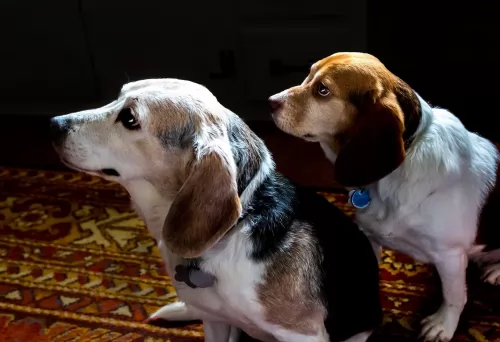 After 4 weeks of birth the puppy can be given solid foods by slowly increasing the ratio for many weeks. The recommended food is fresh meat of chicken breast, lamb, turkey and lean hamburger. The vegetables can be given as raw or steamed. The vegetables that will be good for them are raw baby carrots, broccoli, cauliflower and sweet peas. The puppies should be fed 3 to 4 small meals per day as they require more nutrients for their growth.
After 4 weeks of birth the puppy can be given solid foods by slowly increasing the ratio for many weeks. The recommended food is fresh meat of chicken breast, lamb, turkey and lean hamburger. The vegetables can be given as raw or steamed. The vegetables that will be good for them are raw baby carrots, broccoli, cauliflower and sweet peas. The puppies should be fed 3 to 4 small meals per day as they require more nutrients for their growth.
The grown up dog should be fed with the same food and 1 complete meal is enough for them. The meal should be given at noon. The food should be given based on calories as they should not get overweight. In addition to food, fruits such as blueberries, raspberries, banana and mango can also be given to them periodically.
Beagles should be exercised daily in order to maintain proper weight. Beagles are average shedders and having short hair which is easy to groom. They should be made to bath periodically with a mild shampoo.
Moderate exercise such as walking and cardio exercise such as chasing a ball should be given to them for staying them to be active and for maintaining good health.
 The Curly Coated Retriever is a single-coated dog breed and this makes him a low maintenance dog. He doesn’t shed much and a good brush twice a week will keep the curly coat in good condition. There are some dog owners that trim the feathering around the legs, feet, tail and belly.
The Curly Coated Retriever is a single-coated dog breed and this makes him a low maintenance dog. He doesn’t shed much and a good brush twice a week will keep the curly coat in good condition. There are some dog owners that trim the feathering around the legs, feet, tail and belly.
The Curly Coated Retriever is an attractively low maintenance breed. Therefore he doesn’t require any special diet. He does well on a top quality manufactured dog food where protein is listed at the top.
These dogs are inclined to put on weight easily so you want to be sure to follow the directions on the packaging and not overfeed him. With his kibble, sometimes add in some cooked brown rice, vegetables and chicken.
Raw meat can be expensive but if you can, try and include it into your pet’s diet to avoid nasty skin rashes and allergies. Always make sure that cool, fresh water is available to your dog and make sure the food and water bowls are regularly washed.